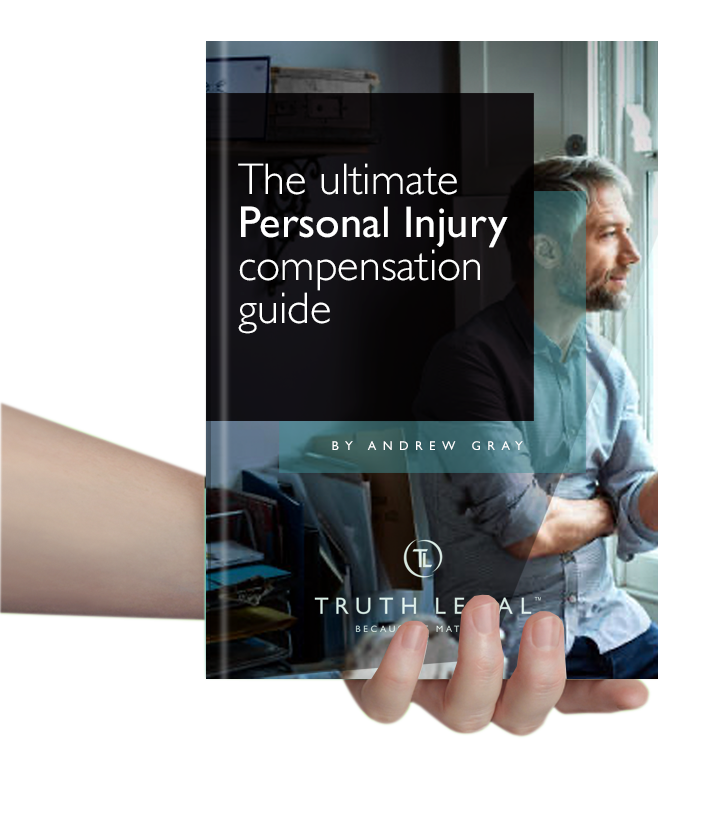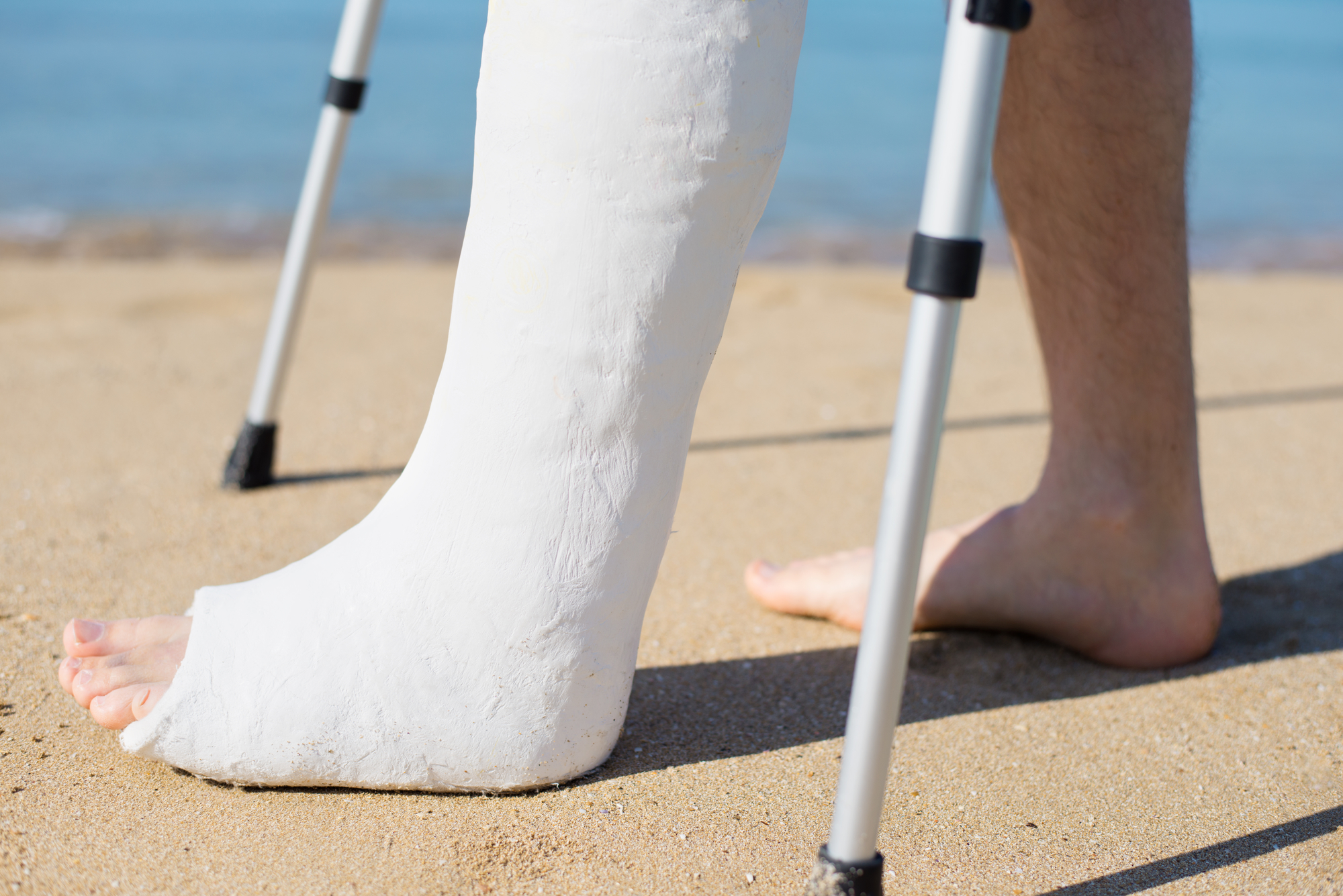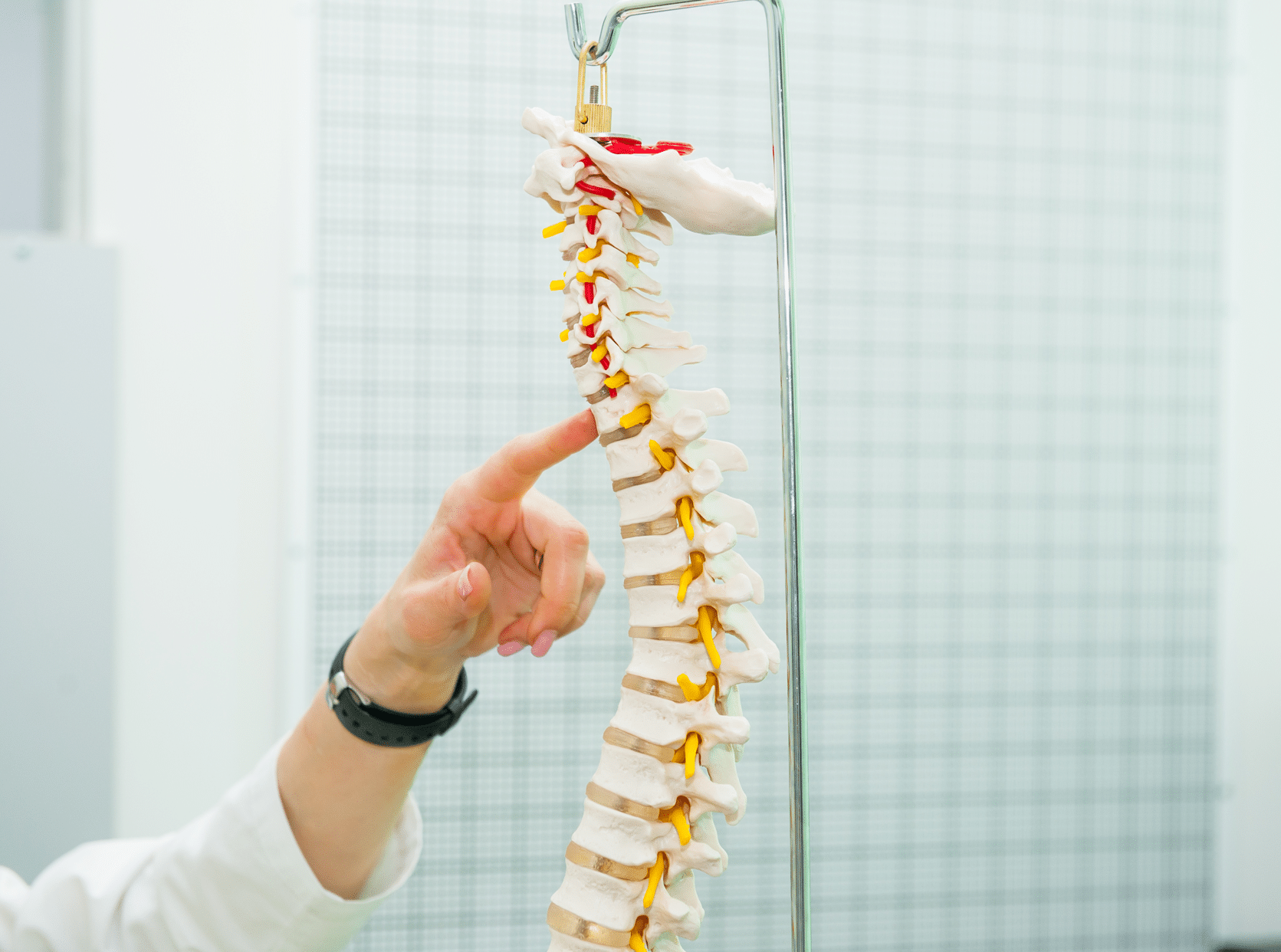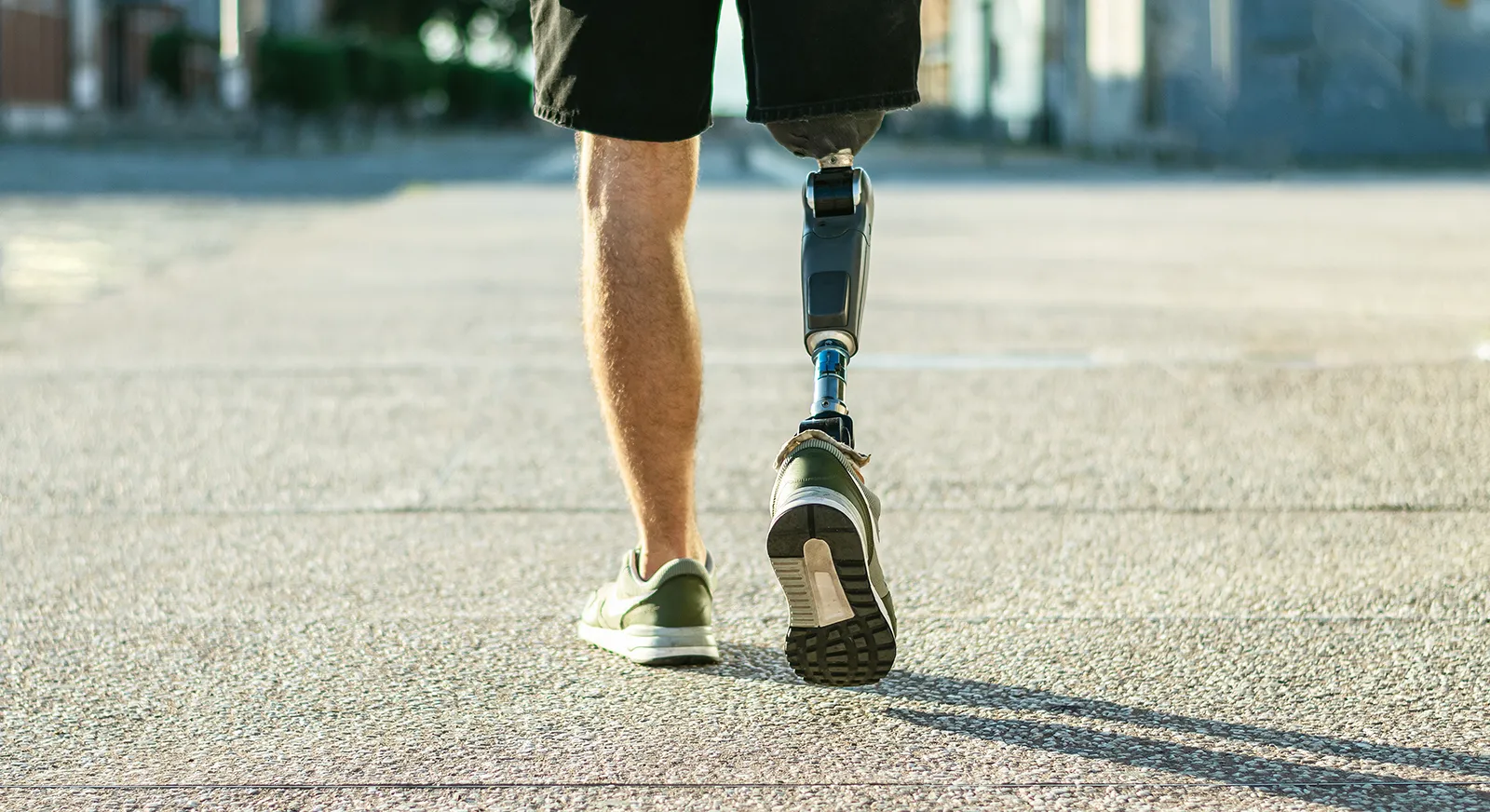The idea behind compensation is to help people who have been injured because of the negligent behaviour of others. It is intended to return victims – as far as possible – to the position they would have been had they not been injured.
If you have been injured in this way, it is only right that you should be compensated for the harm you have suffered. At Truth Legal, our personal injury lawyers are here to help you get the compensation you deserve.
Truth Legal believes that those who are negligent should be held accountable.
When a personal injury claim is brought, it draws attention to what has happened. It sends a message to the party you are claiming against – whether that’s your employer, a healthcare provider, or a motorist – that what happened was unacceptable and that they need to make changes to ensure that such accidents do not happen again.
For certain injuries, getting quick access to treatment can make a huge difference to your overall recovery.
Often, however, this may not be possible due to NHS waiting lists and the cost of private treatment. But when you make a personal injury claim, funding for treatment in many instances be, particularly when the other party’s insurers have admitted fault, be arranged through a medical agency or from the other party’s insurance company. This allows you to receive timely treatment without incurring the cost yourself.
Suffering a personal injury can be life-changing. You may have to take time off work, or perhaps you can no longer go back to your previous employment. This can cause serious financial harm.
Truth Legal will support you in recouping these financial losses through compensation to help you get back on your feet.
If you have suffered serious physical harm, you may require long-term or expensive medical assistance. These costs can often be included in a personal injury claim, in addition to compensation for the injury itself and other financial losses.
Personal injury claims rely greatly on the evidence of independent medical experts. But the reports these experts produce can also help you with matters of diagnosis and long-term care.
Employers have to take care of their workers. If they fail to do so, they can be held legally responsible for the harm that a worker suffers as a result.
Your employer may be liable for your injuries if they failed to:
- Properly assess risks to their workers
- Operate a safe working environment
- Plan or implement safe systems of work
- Provide or maintain appropriate safety equipment
- Provide proper training to you or other staff
- Arrange adequate numbers of staff
Employers can also be held responsible for the behaviour of their workers. So if you were injured through the conduct of one of your co-workers, your employer may also be liable for the harm you have suffered.
Legal time limits apply to all personal injury claims. In general, you must settle your claim or commence court proceedings within 3 years of the date of your accident. Missing this deadline is likely to prevent you from claiming compensation. However, there are situations where a different time limit will apply. In any event, it is always best to seek advice on your potential claim as soon as possible. Get in contact with us to discuss your circumstances.
Compensation for an accident at work (and other personal injury claims) is based on the harm you have suffered because of the accident.
This will include your injuries, but can also include financial losses you have incurred as a result, such as lost earnings and treatment expenses.
However, it also means that the ‘value’ of your claim will depend on the money you have lost and the extent of your injuries.
If you would like to discuss how much your claim might be worth, get in touch with one of our personal injury lawyers today.
Back injuries can vary greatly. The most severe injuries will usually attract the most compensation.
The following figures are from taken from the 14th Edition of the Judicial College Guidelines. These are the same figures that judges often use when assessing the value of a personal injury claim.
| Back Injury | Description and Factors Considered | Compensation |
| Severe | Cases at the lower end of this bracket will involve serious damage to the back, such as fractures of vertebrae or discs and ongoing disability such as pain, discomfort, impaired bodily function, and long-term effects upon quality of life.
Cases which also involve factors such as a loss of sensation, scarring, or an increased combination of effects will warrant the mid-point of this bracket. Towards the upper end of the bracket, cases will involve damage to the spinal cord or nerve roots, causing severe pain, partial paralysis, and impaired bodily function. Only the most severe combinations of these factors will lead to the highest figures. |
£34,000 to £141,150 |
| Moderate | Cases in this bracket include those where there is an ongoing residual disability but which is not as severe as described in the bracket above. This includes less severe fractures, prolapsed discs, nerve root irritation, reduced mobility, and significant pain and discomfort.
Cases towards the lower end of this bracket may include very severe soft-tissue injuries. |
£10,970 to £34,000 |
| Minor | This bracket covers cases with mainly soft-tissue injuries where a full recovery is possible or there is a recovery to ‘nuisance level’ symptoms. | Up to £10,970 |
NB – in very rare and severe cases, which involve complete paralysis, a different set of brackets may be appropriate. For such cases, injuries may warrant an award of up to £354,260.
The descriptions above are only very general. When valuing the compensation which would be reasonable for your injury, many factors will be looked at such as:
- The pain and discomfort you have experienced.
- The duration of your symptoms.
- How your injuries have affected your life.
- The extent of treatment and/or medication you required (or continue to require).
- The combination of different symptoms you have experienced.
As you can see, claiming for a personal injury does not just mean claiming compensation for the pain and suffering your injury has caused, it also involves claiming compensation for how the accident has affected your life. This is a claim for ‘loss of amenity’. The personal injury element of a claim is sometimes called ‘pain, suffering and loss of amenity’.
However, other losses, which have arisen from the accident and injury, can be claimed in addition. Frequently claimed categories of loss include:
- Travel expenses.
- Medical expenses and treatment costs.
- Care and assistance.
- Loss of earnings.
The vast majority of back injury claims (and personal injury claims in general) involve proving you were injured through another party’s negligence. There are several parts to this:
- The other party must have owed you a ‘duty of care’. This term may call to mind a doctor/patient situation. This is one example where a duty of care would exist but the idea of a duty of care covers other situations. For example, it can cover employers and employees and the duty of road users to take care in relation to others.
- They must have failed in their duty of care. This could be because they took certain actions or failed to take appropriate action – anything which meant they did not meet the standards which the law required of them, such as an employer making you carry a heavy weight in contravention of the Manual Handling Regulations.
- Their failure must then have caused your injury.
To succeed in your compensation claim, you must prove each of these points. Sometimes, the other party may accept some of the points themselves. For example, they might admit they were at fault for the accident, or they might accept your injury was caused as a result of it.
Once these points are established, you must then prove the amounts of compensation you are claiming are accurate and reasonable. This means supporting them with evidence.
Because you are making the claim, it is for you to prove all of these things. It is not for the other side to disprove them.
This may make the process sound difficult, but Truth Legal’s expert solicitors will guide and support you throughout your claim, ensuring that we instruct the correct medical experts to comment on your injuries. Our advice and effective handling of your claim will ensure it is made as easy as possible.
Time limits apply to personal injury claims. If too much time has elapsed from your accident, you may be prevented from making a claim.
In most cases, you have 3 years from the date of the accident in which to either settle your claim or begin court proceedings.
This time can quickly run out. If you are thinking of bringing a back injury claim, or you are worried matters have been left for too long, contact us as soon as possible so that we can advise you on where you stand.
There some rules which can change the time limits applicable to your case. Even if you believe you have missed the time limit, it is worth speaking to us to see if anything can be done.
If the accident which caused your back injury was not your fault, Truth Legal can often conduct matters on the basis of a ‘No Win, No Fee’ agreement. In the vast majority of situations, this means you will not have to pay our fees if we are unsuccessful in recovering compensation for you.
On the other hand, if we are successful, our fees will be paid by a portion of your compensation award and also by the other party (or more commonly their insurers). This is how No Win No Fee Agreements usually operate.
If you have any concerns about funding your claim, we are more than willing to discuss matters with you in more depth.
Common types of brain injuries include:
- Second-Impact Syndrome (SIS) – This refers to a rapid swelling of the brain. It is caused by a concussion occurring when the victim is still recovering from an earlier concussion. In some cases, this could be weeks after the original concussion was sustained. It can often prove fatal.
- Diffuse Axonal Injury (DAI) – This is a term given to a kind of trauma over a widespread area of the brain. Unfortunately, it is one of the most common types of traumatic brain injury. It can result in unconsciousness, a persistent vegetative state, and death. If consciousness is regained, there is expected to be a high degree of physical and mental impairment.
- Hypoxic-Anoxic Injuries (HAI) – This covers injuries caused by a partial or complete lack of oxygen to the brain. The brain needs a constant supply of oxygen to function, if the supply is stopped, or insufficient, then brain function will be immediately impaired. After around four minutes without oxygen, lasting damage to brain tissue can occur, leading to the risk of serious cognitive impairment. There are many possible causes, including choking, chemical poisoning, or complications at birth.
- Cerebral contusion – This term refers to a bruising of the brain tissue. A cerebral contusion occurs when the small blood vessels in an area of the brain are damaged, causing blood to leak from them. Cerebral contusions can cause a decline in long-term mental function.
- Coup-contrecoup injury – This term refers to a pattern of cerebral contusions (see above) which can occur at the impact site of a trauma and also upon the opposite side of brain. It happens when strong forces are involved: the initial impact causes one contusion, then the ‘recoil’ effect leads to the brain hitting the inside of the skull on the opposite side, resulting in another area of the brain being damaged.
- Concussion – Concussions are temporary brain injuries caused by a trauma. Their symptoms normally occur straightaway but can appear at a later time, even up to a few days after the trauma. At their most minor, concussion symptoms can include: headaches, dizziness, and nausea. More severe symptoms, however, include: memory loss, persistent vomiting, behavioural changes, and sensory impairment. It is important to monitor concussion symptoms carefully in case they indicate a more serious brain injury. Whilst recovering, it is also very important to avoid any further concussions – (see Second-Impact Syndrome above)
The idea behind compensation is to return you, as far as possible, to your pre-accident situation. The unfortunate truth is that no amount of money will undo the accident.
With serious brain injuries, recovering to a normal way of life is not always possible. Where compensation can assist is in helping to cope with the long-term effects – removing financial worry when you have a new way of life to adjust to.
But claiming compensation isn’t just about countering the negative effects of your accident. It is about making a stand for what’s right, claiming what you are entitled to, and trying to prevent similar negligence affecting someone else in the future. Your claim could drive these changes – perhaps forcing new safety practices to be adopted, for example.
If they have suffered serious brain damage, a loved one may not have the mental capacity to make a claim for themselves. In these situations, you can act on their behalf as a ‘Litigation Friend’.
Please make us aware of this when you discuss the case in more detail. We can also explain to you what acting as a Litigation Friend would entail.
Many factors are taken into account when valuing a personal injury claim. With brain injuries, compensation awards are greatly affected by the extent of any long-term effects or the impairment caused by the injury.
The following figures are from taken from the 13th Edition of the Judicial College Guidelines. Judges use these guidelines when considering what amount of compensation would be reasonable in a case. Even if a judge never becomes involved in the case, solicitors also use the guidelines to assist with valuing personal injuries.
| Injury | Description and Factors Considered | Compensation |
|---|---|---|
| Very Severe Brain Damage | Cases where there has been a significant effect on the senses and severe physical limitation. Little, if any, evidence of meaningful response to stimuli. The need for full-time nursing care.
The court will consider the degree of understanding the victim has, their life expectancy, and the extent of physical limitation. |
£235,790 to £337,700 |
| Moderately Severe Brain Damage | Cases of very severe disability with the need for constant care and substantial dependence upon others. There may be physical disabilities, such as limb paralysis, and a possible, marked impairment of intellect and personality. Life expectancy may have been greatly reduced.
The court will consider the degree of understanding victim has, their life expectancy, the extent of physical limitation, their degree of dependence upon others, their ability to communicate, any behavioural abnormality, and the extent, or the risk, of epilepsy. |
£183,150 to £235,790 |
| Moderate Brain Damage (upper tier) | Cases of moderate to severe intellectual deficit and/or personality change. An effect on sight, speech, and senses. A significant risk of epilepsy and no prospect of employment. | £125,510 to £183,150 |
| Moderate Brain Damage (middle tier) | Cases of moderate to modest intellectual deficit. The ability to work greatly reduced or removed completely and some risk of epilepsy. | £75,900 to £125,510 |
| Moderate Brain Damage (lower tier) | Cases where concentration and memory are affected. A reduction in the ability to work. Very limited dependency on others and a small risk of epilepsy. | £36,000 to £75,900 |
| Less Severe Brain Damage | Cases where a good recovery has been achieved with a return to normal social and work life. Includes the potential for some ongoing impairment such as poor concentration, memory or mood problems. For cases at the high end of this bracket there is a potential small risk of epilepsy.
The court will consider the severity of the initial injury, any permanent disability (or the chance of it), any personality change and its extent, and any depression. |
£12,820 to £35,970 |
| Minor brain or head injury | Cases of minimal brain damage (if any).
The court will consider the severity of the initial injury, the recovery time, any continuing symptoms, and whether the victim has suffered from any headaches. |
£1,840 to £10,670 |
The injuries you have suffered may be the main part of your claim. Essentially, this is a claim for the pain and suffering that the injury has caused you, as well as recognition of the things it has stopped you from doing. Brain injuries can often result in permanent symptoms or impairment. Injury compensation awards can be high to reflect this.
Brain injuries, and severe ones in particular, will affect many parts of your life. This frequently leads to many other losses and expenses being incurred. If losses have resulted directly from the accident and your injuries, you can include them in your claim.
The most common losses include:
- Travel expenses
- Medical expenses and treatment costs
- Loss of earnings
- Care and assistance
Anticipated future losses can also be included in claims. For brain injuries which have caused severe mental or physical disability, these could reflect the costs of life-long care or the possibility that you may never be able to work again.
For more information on what you can claim, download our free Personal Injury Compensation Guide. You can also see examples of a Schedule of Loss in our free legal library.
Traumatic brain injuries refer to injuries where brain damage is caused by an external force. This could be through physical contact, blast waves, or forces causing a rapid ‘acceleration-deceleration’ motion to the head (such as whiplash). The term also includes the secondary effects caused by such trauma – symptoms such as swelling in the brain or oxygen deprivation to areas of brain tissue.
All traumatic brain injuries have the potential to cause catastrophic injuries.
Traumatic brain injuries are often categorised into open and closed injuries:
- Closed – This covers injuries where the skull remains intact but trauma is still caused to the brain. This could be from an impact to the head, which does not perforate the skull, or from sharp jolting movements which displace the brain. These forces can strain and tear nerve tissues, or damage blood vessels leading to internal bleeding in the brain.
- Open or penetrating – This covers injuries where the skull is broken through. Damage to the brain can result from the initial trauma or from the brain being left exposed. High speed collisions and impacts from projectiles or from sharp objects can all cause open head injuries.
Success in a personal injury claim is all down to proof.
You must prove that the other party was negligent and that this caused your injury. You must also prove the extent of your injuries, the losses they have caused, and the amounts of those losses.
As you are making the claim, it is for you to prove these things in the first place. It is not for the other side to disprove them.
Each case has its own challenges. Having the right solicitors to act for you and to guide you through can make all the difference in the service you receive and the skill with which your case is handled.
The duration of a claim depends upon many different circumstances. Some of these factors are:
- Your recovery time. It is always advisable to ensure you are as fully recovered as possible before settling an injury claim. This allows the total extent of your claim to be documented and included.
- Areas of dispute. If the people you are claiming against do not accept some, or all, of your claim, the claim could be lengthened by gathering evidence and proving it to them.
- Court proceedings. Not all cases require the involvement of a court. However, if areas of dispute persist or it becomes necessary to ‘protect’ your right to claim, court proceedings may be unavoidable. This can mean a claim takes longer to resolve, although even if court proceedings are started it does not mean the case will be heard in a courtroom. If it is, a judge will determine any issues in the case, there will not be a jury.
Generally, you must begin your claim within 3 years of the date of the accident. If you do not, you could be prevented from ever doing so.
A number of other rules can change the time limits which apply, however. If you are bringing a claim for someone who does not have the mental capacity to do it themselves, either because of their brain injury or otherwise, the time limit will not ‘run’ whilst they are in this condition. This could easily mean that no time limit applies in their case.
If you are thinking of bringing a brain injury claim, or you are worried it might be too late, contact us as soon as possible so that we can advise you.
If the accident in question was not your fault, Truth Legal can usually help you on the basis of a ‘No Win, No Fee’ agreement. In the vast majority of situations, this means that you do not have to pay our fees if we are unsuccessful in recovering compensation for you.
Upon a successful outcome, some of our fees are paid by a portion of your compensation award, but no deduction is made from any future losses element of your claim, which can often be the largest element of your claim. This is the normal way in which No Win No Fee agreements operate. It is also usual for much of our fees to be paid by the other party or their insurers.
How a claim is funded is always explained in more detail before a claim begins. Please feel free to contact us if you would like to know more.
Your physical and/or psychological injuries are likely to form the main part of your claim. The amount of compensation for injuries is based on two main aspects:
- The pain and suffering you have experienced, or may permanently experience.
- How your symptoms have affected your life.
Both of these aspects combined will be assessed when valuing your injuries.
Besides your injuries, you may incur other losses. If you have incurred a loss as a result of the injuries, or the accident directly, then it is likely you can include them in your claim. Some examples may be:
- Travel expenses
- Medical expenses and treatment costs
- Lost earnings
- Care and assistance
If you have not incurred a particular loss, but you are likely to incur it in future, you may be able to claim for this as well. This might include the costs of treatment which you will need in future.
Claiming compensation for someone else’s negligence involves establishing several key points. You have to prove:
- The party you are claiming from had a duty of care towards you and they failed in their duty. All road-users have these duties of care to one another. Failing in their duty, in legal terms, means that the other party did not meet the standards of a reasonably competent driver – in either what they did or did not do.
- Their ‘failure’ caused your injuries and other losses.
- The injuries and losses for which you are claiming are reasonable.
In passenger claims, Point 1 will rarely cause a problem. Passengers are not responsible for controlling any vehicle so it would only be in very rare circumstances a passenger could be at fault. However, it does not necessarily mean that the driver of another vehicle is liable for the accident.
If the driver of the vehicle you were in is at fault for the accident, you can still make a claim. Your claim would instead be directed against their insurance company rather than that of any other driver. You may be unwilling to claim against a friend or family member who was driving. However, bear in mind that this is one of the main reasons why drivers must have insurance. Also, in most cases, the compensation for your injuries and losses is likely to outweigh the costs of any increased premiums your friend/family member may have to pay.
Point 2 will often have to be established with medical evidence. However, if you were not wearing a seatbelt at the time of the accident, your compensation claim could be affected. Often it will result in a reduction of your compensation. If the party you are claiming from can prove your injuries wouldn’t have happened had you been wearing the seatbelt, the reduction is likely to be 25%.
All of the above points may sound daunting, but Truth Legal can help you every step of the way. With our specialist experience, we will ensure you recover the right level of compensation.
If a child under the age of 18 was injured as a passenger, they will need someone to act on their behalf to bring a claim. If you act for them, you will be known as their ‘Litigation Friend’.
Parents, or guardians, in daily contact with the child will often make the best Litigation Friends. Ideally, the driver of the vehicle in which the child was a passenger should not act as their Litigation Friend. This is because a ‘conflict of interest’ can arise if it becomes necessary to claim any or all compensation from the driver’s insurance company.
Please make us aware of any young children involved in the accident when you discuss the case with us. We can also explain further what acting as a Litigation Friend will entail.
There are legal time limits placed on personal injury claims. In general, you have 3 years from the date of the accident in which to settle your claim or begin court proceedings. If you are outside this time limit, you will no longer be able to claim compensation for the accident.
There are some exceptions to this, however, and in some situations extra time may be granted by a court.
If you have suffered an injury as a passenger, seek legal advice right away to make sure you don’t miss your chance to claim. Contact us now if you are worried about these time limits or you would like to discuss your situation.
You are entitled to choose your legal representatives and this includes being able to change solicitors if you wish to. Switching solicitors is actually a straightforward process.
When you inform them of an accident, insurance companies will often pass your details to a claims management company. All the claims management company will do is shunt your case to one of the law firms they have agreements with. This means that your case will often be assigned to legal representatives which you have not chosen. Making your claim with the right firm of specialists, whom you trust, is vitally important in a personal injury claim.
If you find yourself in this situation, consider switching your solicitors to Truth Legal. Firms chosen by claims management companies are often set up to deal with high volumes of cases instead of giving their clients a quality bespoke service.
Similarly, if your solicitors or the unqualified people running your case do not understand passenger accident claims, then you should also consider changing solicitors. It is imperative that your representatives obtain the correct medical evidence to support your injury claim.
To successfully make a compensation claim for injuries sustained in a care home or nursing home, it must be shown that the home or its employees were negligent in their care towards your loved one.
To establish care home negligence, it must be proved that:
- your loved one was owed a duty of care by the care home
- the care home failed in this duty, or their standards fell short of those required
- your loved one suffered an injury as a direct consequence of this
A care home automatically owes a duty of care to all of its residents. It is also responsible for the actions of the staff it employs. As such, establishing that a duty of care exists is very unlikely to be a problem.
Proving the other two steps is often more significant to a claim’s success. However, Truth Legal has years of experience in making successful care home compensation claims. We will tenaciously fight your cause to achieve a fair result. We have offices in Harrogate, Hull and Leeds and we have a presence in York, London and Manchester. No matter where you might be, we pride ourselves on giving all of our clients an exceptional service, provided by personal injury solicitors, not paralegals in a call centre.
In general: no. An adult who has suffered a personal injury usually has to bring a compensation claim for themselves and in their own name.
However, there are situations in which you can make a compensation claim on a loved one’s behalf:
- If they lack the ‘mental capacity’ required. In the legal sense of the phrase, this means if your loved one can’t take in information, process and consider it, and then you can may be able to make a decision on their behalf.
- If your loved one has sadly passed away. If you have been appointed as their personal representative you can bring a claim on behalf of their estate.
- If you have been granted a Power of Attorney by your loved one. A Power of Attorney gives you legal authority to act on someone’s behalf. However, the extent of what you can and can’t do for them depends upon the contents of the Power itself.
When a loved one in a care home has suffered an injury they might not want the ‘hassle’ of bringing a care home compensation claim, or may want to avoid ‘making a fuss’. This is perfectly understandable.
However, Truth Legal has helped many people through the care home compensation claims process. Our expertise and experience ensures that we can conduct your claim as quickly and painlessly as possible. We passionately believe in the good that personal injury claims can do: making the negligent party pay for their mistakes, ensuring that they don’t treat other people in the same way, and as result taking the burden off the State.
The fact is: if sub-standard care or other mistreatment has caused your loved one an injury, they deserve to be compensated. Shouldn’t those who have caused the pain and suffering be held to account for what they have done? Shouldn’t they be given a strong incentive to ensure that this should not be allowed to happen to anyone else?
As with all claims, a time limit applies. In general, your loved one must begin their compensation claim within 3 years of the date of the accident in question. A number of rules may change the time limits which apply to your case. If your loved one is thinking of bringing a personal injury claim, or you are worried matters have been left for too long, contact us as soon as possible so that we can advise you on where you stand.
If your loved one’s injury was not their fault, we are often able to conduct matters on the basis of a ‘No Win, No Fee’ agreement.
This means, in the vast majority of situations, that your loved one will not have to pay our fees if we are unsuccessful in recovering compensation for them. On the other hand, if we are successful, our fees will be paid by a portion of your loved one’s compensation award and also by the care home’s insurers.
If you have any concerns on how a claim is funded, we are more than willing to discuss matters with you in more depth. Please feel free to contact us.
Chronic pain conditions have only been recognised relatively recently. They are often difficult to diagnose as GPs cannot detect anything specifically ‘wrong’ with the patient. Yet, they are very real and represent a serious diagnosis of long-term pain and suffering – possibly arising after an injury or accident.
As well as specific incidents, chronic pain can also be caused by medical conditions such as:
- Chronic Pain Syndrome
- Chronic Fatigue Syndrome
- Arthritis
- Surgical trauma
- Fibromyalgia
- Complex Regional Pain Syndrome
- Somatoform Disorder
If you are suffering from chronic pain, it is essential to seek specialist medical care, as well as expert legal support if you believe it stems from an accident that wasn’t your fault.
Symptoms of chronic pain can vary on a case by case basis, but they include:
- joint pain
- muscle aches
- burning pain
- fatigue
- sleep problems
- loss of stamina and flexibility, due to decreased activity
- mood problems, including depression, anxiety, and irritability
When suffering from chronic pain, it can be difficult to convince specialists that there is really something wrong due to the lack of apparent cause. This can cause anxiety in sufferers that they will not be believed.
At Truth Legal, we understand that chronic pain is very real. When caused by an accident that wasn’t your fault, you deserve compensation. Our team of expert Personal Injury lawyers are here to support your chronic pain claim to achieve just that.
Claim values for chronic pain can vary widely and depends on factors such as the level of pain you experience and the impact it has on your quality of life. However, there are some guidelines from the Judicial College to provide an estimate of how much a Chronic Pain claim might be worth.
Complex Regional Pain Syndrome
Moderate: £28,030 to £52,500.
Severe: £52,500 to £84,010.
Other Pain Disorders
Moderate: £21,070 to £38,490
Severe: £42,130 to £62,990
Additional factors to the value of your claim might be other expenses such as loss of earnings, past and future medical expenses or treatment costs, additional transport expenses, and adaptions made to homes or vehicles.
Chronic pain claims require a medical diagnosis of the issue as symptoms may occur months or even years after the injury. This is why it is important to gain the support of a medical specialist in this area.
If your chronic pain was caused by an accident at work, our Personal Injury solicitors can bolster your claim by obtaining evidence from witnesses, and potentially employer records of the incident. It is also important to have a clear timeline of the events leading up to, and after the incident took place. This allows for the finding of negligence which caused the accident to occur and prove the cause of your chronic pain.
Chronic pain can stem from a range of different accidents. Symptoms can occur months or even years after the incident occurred. Truth Legal has dealt with chronic pain claims after:
CICA Criminal Injuries Claim
TIME LIMIT: 2 Years*
We can help you to claim through the Criminal Injuries Compensation Authority (CICA)
Our dedicated page on CICA Criminal Injury Claims can tell you more.
Civil Claim Against a Third Party
TIME LIMIT: 3 Years*
Some third parties can owe you a duty of care in certain situations.
The most common example is your employer. If you have been assaulted at work you may have a claim against them.
Civil Claim Against Your Attacker
TIME LIMIT: 3 Years*
If the identity of your attacker is known, and they have the funds or assets to cover your compensation and legal costs, you may be able to claim against them directly.
* These are the normal time limits for making a criminal injury compensation claim, starting from the date of your injury. They can sometimes change. If you are unsure, contact us to discuss your circumstances.
We understand how frightening it can be to suffer an assault or criminal injury. And that the psychological effects can often persist long after the physical injuries have healed.
Truth Legal’s founder, Andrew Gray, was assaulted on his first day as a trainee solicitor (you can read about his experience here). And Truth Legal was originally set up to help people who had been assaulted at work.
Over the years, our team of expert personal injury solicitors have seen how assaults and attacks can affect the lives of innocent people. We have helped many clients to claim the compensation they deserve after their ordeal.
We offer:
- Specialist technical knowledge and experience – so you can rest assured that your case is in the best hands.
- Practical advice – tailored to your situation.
- Strong representation – fighting for the compensation and outcome you deserve.
- Support and compassion – friendly, knowledgeable professionals on your side through a difficult time.
To find out more, read our blog: 5 Reasons Why Truth Legal Might Be Right For Your Personal Injury Claim.
For a criminal injury compensation claim directly against your attacker, you will need to prove that the assault took place, and that it caused the injuries you are claiming for.
The first of these requirements will be proved automatically if your attacker has been convicted of a criminal offence in relation to the attack.
This is because criminal cases require a higher standard of proof than civil cases (‘beyond reasonable doubt’ instead of ‘on the balance of probabilities’). As such, evidence satisfying a criminal court will be enough to prove liability in a civil claim automatically.
For criminal injury compensation claims against a third party, it’s slightly different. You will have to prove that the third party owed you a duty of care, that they failed in that duty, and that this failure caused your injuries, or contributed to them.
For a CICA criminal injury compensation claim, our article here explains the requirements and the process involved.
If you are eligible to make a CICA claim and another claim alongside it (such as an assault at work claim against your employer), it is possible to make both.
However, you will not be compensated twice for the same harm. In other words, you will be compensated for your injuries but each claim will take into account what you have received under the other.
For example, if you recover injury compensation from the CICA, and later receive compensation from your employer, you will have to repay the appropriate amount to the CICA from the later compensation.
Likewise, if you received criminal injury compensation from your employer first, the CICA may withhold or reduce any compensation they award – so that you are only compensated for your injuries once.
In order to make a successful claim, there are several elements we have to prove:
- you were owed a duty of care by the farm owner
- they failed in this duty, or their standards fell short of those required
- you suffered an injury as a direct consequence of this
As mentioned above, farm owners owe a duty of care to workers and to visitors, so the first element is straightforward. It is the last two elements which are significant in many cases.
Examples of a farm owner failing in their duty of care could include:
- Failing to provide training on safe working practices
- Poor maintenance of vehicles or machinery
- Failing to display adequate warning signs
- Failing to provide any or adequate protective equipment, such as gloves, boots, ear defenders, or eye protection etc
Besides claiming for your injuries themselves, you can include many other expenses and losses which have resulted from your injuries.
With all additional losses, it is important to document them as much as is possible so that the loss, and the amount you are claiming for, can be proved.
Depending on the circumstances of your case, you could claim for:
- Travel expenses – to attend your GP or hospital, for example
- Medical expenses and treatment costs – such as painkillers or physiotherapy sessions.
- Care and assistance – if your injuries required a friend or relative to provide significant help in your daily life.
- Loss of earnings – if you took time off work and did not receive full pay, or you lost a bonus due to your absence.
- Future losses – if your working life is to be shortened, or if you are to earn less money in a new role you have had to take because of the accident.
This list is by no means exhaustive. If you have suffered other losses not mentioned above, then make sure you discuss these with us so we can advise you accordingly.
As with all claims, a time limit applies.
In general, you must begin your claim within 3 years of the date of the accident in question.
The time limit might be longer in certain situations. For example, if you are diagnosed with an occupational health condition, perhaps many years after it was caused, then the time limit would usually start running from the date of diagnosis.
A number of rules may change the time limits which apply to your case. If you are thinking of bringing a personal injury claim, or you are worried matters have been left for too long, contact us as soon as possible so that we can advise you on where you stand.
If the accident was not your fault, we are often able to conduct matters on the basis of a ‘No Win, No Fee’ agreement.
This means, in the vast majority of situations, that you will not have to pay our fees if we are unsuccessful in recovering compensation for you. On the other hand, if we are successful, our fees will be paid by a portion of your compensation award and also by the farm owner’s insurers.
If you have any concerns on how a personal injury claim is funded, we are more than willing to discuss matters with you in more depth. Please feel free to contact us.
We are personal injury specialists of the highest integrity, committed to recovering compensation for ordinary people who are entitled to it.
Whilst our head office is in Harrogate, Truth Legal also has offices in Hull and Leeds and a local presence in York, Manchester and London. We are more than willing to sit down with you for a free, no-obligation consultation and to discuss any ways in which we can help you.
Whilst a hairdresser is serving you, they owe you a duty of care. This is similar to how a doctor or a dentist must not cause harm whilst you are under their care. This means if your hairdresser is careless or does not meet the standard of care that someone would normally expect, they could be held to have been negligent. If your hairdresser has been negligent, and you have been injured as a result then this will be the basis of your compensation claim against them.
Examples of how a hairdresser could act negligently include:
- Failing to check if you are allergic to a hair product.
- Over-applying or incorrectly preparing chemical products.
- Cutting you with scissors or a razor.
- In any way damaging your hair or skin.
Tripping or slipping over in a hairdressers would mean a slightly different kind of personal injury claim. Have a look at our page on trip and slip claims for more information.
When making a personal injury claim, you must prove you have suffered your injuries and losses, as well as establishing that the party you are claiming from is responsible for them. Collecting evidence, as soon as possible, to prove these points can greatly improve your chances of a successful claim. For hairdresser claims, important evidence could include:
- Details of the hairdresser and the date and time of your appointment.
- Details of the hairdresser’s actions, such as what preparations they undertook, what products were applied, what was said etc.
- Photographs of your hair before and after the accident.
- Details of any witnesses to your accident.
This may sound overwhelming, but Truth Legal’s expert solicitors will guide and support you throughout your claim. We have extensive experience of building successful personal injury compensation claims. Our advice and effective handling of your claim will ensure your claim is as easy as possible.
Besides your injuries, you can claim for losses which you have suffered as a consequence of the accident or injury. Common types of loss include:
- Travel expenses – such as for journeys to medical appointments, treatment sessions, your GP, or the hospital.
- Care and assistance – if friends or family had to help you due to your injuries.
- Loss of earnings – from time taken off work.
- Medical expenses and treatment costs.
However, your injuries will often be the greatest harm or loss you have suffered in the accident. Many factors are looked at when determining how much compensation should be awarded for your injury. These include:
- The pain and discomfort you have experienced.
- The duration of your symptoms.
- How your injuries have affected your life.
- The extent of treatment and/or medication you required (or continue to require).
- Whether you have suffered multiple injuries.
The law imposes time limits on personal injury claims. If too much time has elapsed from your accident, you may be prevented from making a claim.
In general, the time limit means you have 3 years from the date of your accident in which to either settle your claim or begin court proceedings, unless you are under 18 or have been incapacitated.
This time can quickly run out. If you are thinking of bringing a claim after a hairdressing accident, or you are worried matters have been left for too long, contact us as soon as possible so we can advise you on your position.
Some other rules can change the time limit which may apply in your case. So even if you believe you have missed the deadline, it is worth speaking to us to see if anything can be done.
In some situations, yes. Sadly, the effects of serious head injuries can mean that a victim is no longer mentally able to bring a claim for themselves. They may not have capacity to bring a compensation claim themselves.
If your loved one is in this position, you can bring a claim on their behalf as their ‘Litigation Friend’. Please contact us to discuss this in more detail.
As head injuries can vary greatly in severity, so too can the amount of compensation you could receive. No online compensation calculator is ever going to be able to adequately value your claim.
The following figures are from taken from the 13th Edition of the Judicial College Guidelines. The Judicial College Guidelines are produced by top lawyers and Judges and provide guidance as to what compensation a personal injury client should receive. As the brackets below are wide, in order to value the injury element of a personal injury claim, a personal injury solicitor should perform legal research in order to see what courts usually value a claim at.
Very Severe Brain Damage
- Cases where there has been a significant effect on the senses and severe physical limitation. Little, if any, evidence of meaningful response to stimuli. The need for full-time nursing care.
- The court will consider the degree of understanding the victim has, their life expectancy, and the extent of physical limitation.
- £235,790 to £337,700
Moderately Severe Brain Damage
- Cases of very severe disability with the need for constant care and substantial dependence upon others. There may be physical disabilities, such as limb paralysis, and a possible, marked impairment of intellect and personality. Life expectancy may have been greatly reduced.
- The court will consider the degree of understanding victim has, their life expectancy, the extent of physical limitation, their degree of dependence upon others, their ability to communicate, any behavioural abnormality, and the extent, or the risk, of epilepsy.
- £183,150 to £235,790
Moderate Brain Damage (upper tier)
- Cases of moderate to severe intellectual deficit and/or personality change. An effect on sight, speech, and senses. A significant risk of epilepsy and no prospect of employment.
- £125,510 to £183,150
Moderate Brain Damage (middle tier)
- Cases of moderate to modest intellectual deficit. The ability to work greatly reduced or removed completely and some risk of epilepsy.
- £75,900 to £125,510
Moderate Brain Damage (lower tier)
- Cases where concentration and memory are affected. A reduction in the ability to work. Very limited dependency on others and a small risk of epilepsy.
- £36,000 to £75,900
Less Severe Brain Damage
- Cases where a good recovery has been achieved with a return to normal social and work life. Includes the potential for some ongoing impairment such as poor concentration, memory or mood problems. For cases at the high end of this bracket there is a potential small risk of epilepsy.
- The court will consider the severity of the initial injury, any permanent disability (or the chance of it), any personality change and its extent, and any depression.
- £12,820 to £35,970
Minor brain or head injury
- Cases of minimal brain damage (if any).
- The court will consider the severity of the initial injury, the recovery time, any continuing symptoms, and whether the victim has suffered from any headaches.
- £1,840 to £10,670
To put these numbers in perspective, the awards for neck injuries, for example, range from a few hundred pounds to around £124,030 at their very maximum. And that upper figure is for people who will be permanently restricted to little or no mobility in their neck.
When you claim for an injury, you are claiming for the pain and suffering that an injury has caused. You also can claim for ‘loss of amenity’ – essentially, the things your injury has prevented you from doing, affecting the enjoyment of your normal life. The claim for pain, suffering and loss of amenity is normally the main element of any personal injury claim.
However, other losses, which have arisen from the accident and injury, can also be claimed. These could include:
- Travel expenses – to attend your GP or hospital, for example.
- Medical expenses and treatment costs – such as painkillers or rehabilitation treatment.
- Care and assistance – especially where a severe head injury might restrict your abilities, requiring extensive care and help with your daily life.
- Loss of earnings – for lost wages or bonuses, missed in the time you spent away from work.
For more information on what you can include in a claim, download our free Personal Injury Compensation Guide.
All of these out-of-pocket losses should be compiled in a Schedule of Loss. Particularly in cases of brain or head injury a very detailed Schedule of Loss ought to be produced by the Claimant’s Solicitors. An example Schedule of Loss can be found in our free legal library.
Cases involving head injuries require specialist legal knowledge. You should always instruct an experienced firm of solicitors to deal with such a claim. Ask your solicitor whether they have experience of head or brain injuries before and, if so, how many. Don’t assume that your lawyer is familiar with your injuries just because they are personal injury lawyers.
If your head injury is not the only injury you sustained in the accident, sub-standard legal representation could mean it is not properly investigated, or that it is missed out of your claim altogether, particularly if the head injury is incorrectly assumed to be a lesser injury to, say, a fracture.
At Truth Legal, Helen Beaumont is a specialist solicitor who has dealt with hundreds of personal injury claims. Many of these have included head injuries. She has the expertise needed to recognise the situations where in-depth, focused medico-legal evidence is required to fully investigate a potential head injury.
Truth Legal are personal injury experts who work tirelessly to obtain the compensation that our clients deserve. We pride ourselves on delivering an ethical, bespoke and efficient service, working as as team with our clients.
If we sound like the kind of solicitors you wish to instruct for your claim, contact us. Remember, even if your case has been assigned to a particular firm by a claims management company, you are entitled to instruct whichever solicitors you wish. We specialise in taking over compensation claims when other firms have provided a sub-standard service.
In order to successfully claim compensation for a head injury, you must prove that it was caused by the negligence of the party you are claiming against. There are several parts to this:
- The other party must have owed you a ‘duty of care’. This term may call to mind a doctor/patient situation. Undoubtedly this is one instance of a duty of care exists but the concept covers many other situations. For example, it can cover employers and employees and the duty of road users to take care in relation to others.
- The Defendant must have failed in their duty of care to the Claimant in order to substantiate a personal injury compensation claim. This can be through either something they did, or something they did not do, which meant they did not meet the standards the law required of them.
- Their failure must then have caused your injury. “Causation” is often the most disputed element of any personal injury claim.
To be successful in your compensation claim, you must prove each of these points – unless the other party accepts that they were negligent. You must also prove the amount of every item you are claiming for and support it with evidence. As the party making the claim, it is for you to prove it – not for the other side to disprove it, just as you would for any insurance claim.
This may make the process sound difficult, but Truth Legal will guide you through each step. We will ensure that making your claim is as easy as possible, explaining each step to you.
There is no definite answer to this.
If you have been involved in an accident, it is understandable to want everything to get back to normal as soon as possible. And we understand that this can extend to any personal injury claims you are pursuing. We will guide you through every stage of your claim. We can’t promise that your claim will be completed quickly – no law firm can in all honesty – but we can promise to work with you to make the process as hassle-free as possible.
The duration of a claim depends upon many different circumstances. One of them is your recovery time. It is always best to make sure your injuries are as completely resolved as possible before settling a claim – that way the extent of your injuries can be properly documented and all additional losses you have suffered can be included in your claim.
Other factors can also play a part. If the people you are claiming from are disputing certain aspects of your claim, it can take time to gather and present the evidence required to establish your case.
Areas of dispute can also lead to court proceedings. These tend to lengthen the time a claim will take. However, even if court proceedings are started, the vast majority of cases are resolved before they need to be heard in a courtroom by a Judge (not a jury).
In general, you must begin your personal injury claim within 3 years of the date of the accident.
If too much time has passed since the accident in question, you might be prevented from making a claim. See our Knowledge Centre entry on limitation periods.
There are a number of rules which can change the time limits which apply to your case. If you are thinking of bringing a head injury claim, or you are worried matters have been left for too long, contact us as soon as possible so that we can advise you on where you stand. Limitation law is called complicated.
If the accident which caused your head injury was not your fault, then Truth Legal Solicitors can often conduct matters on the basis of a ‘No Win, No Fee’ agreement. In the vast majority of situations, this means that you will not have to pay our fees if we are unsuccessful in recovering compensation for you.
On the other hand, if we are successful, our fees will be paid by a portion of your compensation award and also by the other party (or more commonly their insurers). This is standard practice.
If you have any concerns on how a head injury claim is funded, we are more than willing to discuss matters with you in more depth. It is our mission to be candid with our clients. We prefer to use No Win, No Fee agreements.
If you would like more information on claiming for a head injury, or you wish to discuss your situation, contact us today. We would be more than happy to chat things through with you in a free consultation, with no obligation to proceed further.
Let us help you to claim the compensation you deserve.
Claiming compensation for inadequate PPE can help get your life back to normal as far as possible following an accident.
The purpose of compensation is to return you, through financial means, to your pre-accident situation. Whilst it is unfortunately true that some harm cannot be ‘fixed’ with any amount of money, compensation can mitigate the negative effects from the accident and help you to rebuild your life. In the aftermath of your accident, you may have to adjust to a new way of living. This can be stressful enough without financial worries placed on top – compensation can help to ease these added pressures.
But if you are claiming for an injury because of inadequate or defective safety equipment, there are other issues at stake. Besides countering the negative effects you have suffered, your claim represents making a stand for what’s right. You are claiming recompense to which you are entitled, and your claim can act as a strong deterrent against similar conduct or negligence in the future. It can prevent the same thing from happening to others.
Making a successful personal injury claim for inadequate PPE
To be successful in your personal injury claim, you must prove several legal elements:
- Your employer failed in their duty of care towards you;
- Their failure caused your injury; and
- The injuries and losses you are claiming for are reasonable.
Employers have general legal duties which require them to keep their workers as safe as possible. This requires them to do all they reasonably can to ensure health and safety. But in relation to PPE there are more specific duties with which employers must comply. The Personal Protective Equipment Regulations 1992 direct employers to:
- Conduct a full risk assessment as to the hazards in the workplace and the PPE required to protect against them.
- Make sure PPE is suitable to provide the appropriate level of protection.
- Keep PPE properly maintained in a good condition.
- Monitor the use and maintenance of PPE.
- Display safety signs to remind workers when PPE must be worn.
- Train workers in the correct use of the PPE, including when and how it must be used, and how to check it is in good repair and working order.
The Regulations also make it clear that the need for PPE should be avoided if at all possible. Supplying PPE should only be used as a last resort where those risks cannot be eliminated or reduced by any other means.
If your employer has not met their duties under these regulations, and you have suffered an injury, this will provide a strong basis for a claim.
Your injuries will likely be the main ‘harm’ for which you are claiming compensation. Compensation awarded for injuries is based upon two things:
- The pain and suffering the injuries have caused you; and
- What the injuries have prevented you from doing, or enjoying in normal life.
However, it is unlikely that your injuries will be the only loss you have suffered. Many financial losses can follow on from an accident, or occur as a consequence of your injuries. Some standard categories of losses are:
- Loss of earnings – When you have been forced to miss work or otherwise lose out on income. This can cover many kinds of income such as: lost wages, bonus payments, commission, or anticipated earnings.
- Travel expenses – For journeys made necessary by the accident, such as to attend your GP or hospital.
- Medical expenses and treatment costs – To assist your recovery, such as painkillers or rehabilitation treatment.
- Care and assistance – Where friends, family, or healthcare professionals are required to help you in your daily life.
There are many other kinds of loss for which you can claim compensation. If you would like to know more, download our free ebook: The Ultimate Personal Injury Compensation Guide.
All personal injury claims are restricted by legal time limits. The usual time limit for personal injury claims is 3 years, meaning that claim must be settled, or court proceedings commenced, within 3 years of the accident.
There are exceptions to this, however. For example, if you have suffered an industrial disease due to inadequate PPE, then it may not be obvious when exactly your ‘injury’ was caused. With industrial diseases like occupational asthma, it may be some time after the harmful exposure before any symptoms develop. In cases like this, a 3-year time limit runs instead from the date when you knew, or ought to have had known, of the harm you had suffered. Often this will be when you were diagnosed with your condition.
Further exceptions may apply to these time limit rules as well, meaning the situation can become complicated. It is always advisable to act as soon as possible if you think you may have a personal injury claim. If you are concerned about time limits or wish to know where you stand, please do not hesitate to contact us.
If you have suffered an injury at work or developed an industrial disease as a result of inadequate PPE, you may be able to claim compensation from your employer.
Truth Legal’s specialist personal injury and accident at work solicitors can help you to recover this compensation. We will work tirelessly to build your case and achieve the positive outcome you deserve. Our firm prides itself on delivering an ethical, honest, and efficient service, whilst having an in-depth knowledge of PPE claims.
Let us help you to claim the compensation you deserve.
An industrial accident claim does not only include the injuries you’ve suffered. Your life can be affected in many different ways as a result a workplace injury. This can lead to you incurring many other losses and expenses. If these losses have arisen as a direct consequence of the accident at work or your injuries you can include them in your claim.
Some of the most common losses include:
- Travel expenses
- Medical expenses and treatment costs
- Loss of earnings
- Care and assistance
- Future loss of earnings
Besides losses you have already incurred, you can include losses which you anticipate you will incur in future. These future losses, like all losses in your claim, must be supported by evidence and must follow as a direct result of your injuries.
For example, if the harm you sustained will mean you need long-term care in future, any expenses relating to this could be added in your compensation claim.
To find out more about the different kinds of loss for which you can claim compensation, download our free ebook: The Ultimate Personal Injury Compensation Guide.
Legal time limits apply to all personal injury claims. As a general rule, you must settle your claim, or start court proceedings, within 3 years of the date of the accident.
There are situations, however, where different limits will apply. For example, if you have suffered an industrial disease, then it may be difficult to pinpoint a date when your ‘injury’ occurred. With some conditions, such as occupational asthma, symptoms may take time to develop after the harmful exposure. In these situations, a 3-year time limit will run from the date when you knew, or ought to have had known, of the harm you had suffered. In most cases this will be when a doctor diagnoses you with your condition.
Other complicated rules can also change the time limit which applies. If you think you may have a personal injury claim, it is best to consult a solicitor for advice as soon as possible to avoid the risk of running out of time. If you are concerned about time limits or wish to know where you stand, please do not hesitate to contact us.
There are unfortunately many ways in which a pedestrian accident can occur. For example:
- Careless or dangerous driving by another road user. This could involve ignoring a red traffic light or other road signs, failing to give way at a pedestrian crossing, or making a manoeuvre without proper observations.
- Drunk drivers or someone driving under the influence of drugs.
- Hit and run drivers. Apart from any moral issues, it is a criminal offence to leave the scene of an accident without stopping. Claims can often be pursued even if the other driver is untraced.[link to untraced drivers claims page]
There are several steps to legally establishing a personal injury claim. You must prove:
- A duty of care – The party you are claiming against must have owed a duty of care towards you. Road-users owe duties of care to one another so this is rarely at issue in a pedestrian accident claim.
- Breach of that duty – The other party must have failed in their duty somehow. For a car driver, the standard they must meet is that of a reasonably competent driver. If they have fallen below this standard, then they have breached their duty of care. An example would be a driver failing to stop at a red traffic light. It is fair to say a ‘reasonably competent’ driver would have stopped at the light.
- Causation – The breach mentioned above must have caused your injuries and other losses. Continuing the above example, if the driver who ran a red light collided with you as you crossed the road, any injuries sustained from that collision will have been caused by the driver’s breach of duty.
- Reasonable injuries and losses – The compensation you claim for your injuries and losses must be reasonable. As an extreme example, you might incur travel expenses for attending treatment sessions but hiring a helicopter to take you to them would not be a reasonable expense!
Pedestrians also hold duties of care towards other road-users. As such, it is possible for pedestrians to be liable for accidents if they have breached their duty. One example could be walking out into the road suddenly without looking. If you are worried that your conduct could be partially to blame for your accident, it does not necessarily mean you cannot make a claim. If you are held to be liable in part, it will usually mean a reduction in your compensation. Motorists have the greater potential to hurt others so their conduct is generally held to a higher standard.
Legal time limits apply to all personal injury claims. The general rule is that you must settle your claim or commence court proceedings within 3 years of the date of your accident. Missing this deadline means you will probably be unable to claim compensation.
Other rules can change the time limit which applies though, and courts also have the power to allow cases beyond the deadline. However, it is always best to investigate your potential claim as soon as possible. Contact us now to discuss your legal position.
Compensation for a personal injury is based upon extent of the harm you have suffered – and includes consideration of how your life has been affected.
This means that many circumstances have to be taken into account to accurately value your injury compensation.
When you instruct Truth Legal, our expert lawyers will value your personal injury claim as soon as they have the information to do so. This ensures that you have a valuation founded upon your unique situation.
If you would like to know more about how personal injuries are valued, download our free ebook: The Ultimate Personal Injury Compensation Guide, which also covers the different kinds of losses you may be able to include in your claim.
As with all personal injury claims, a time limit applies.
In general, you must claim within 3 years of the date of your accident.
However, there are rules which can change the time limit so, if you are worried you have left it too long, it is still worth seeking advice. Whatever your situation, if you are thinking of bringing a personal injury claim, it is always best to seek legal advice as soon as possible. Contact us today so that we can advise you on your circumstances.
If you were injured whilst on private property – such as someone else’s home or on private land – you may still be able to make a claim.
In general, you must have been on the property lawfully (such as by invitation or with permission) and you must be able to prove the owner or occupier was at fault in some way for your injury.
However, there may also be other things to consider before making a claim, such as any relationship you have with the property owner and/or whether they would have the financial means (or the insurance cover) to compensate you.
We recommend that you seek specialist legal advice as early as possible if you are considering this kind of claim.
Funding a personal injury claim is a common worry for people thinking about making one. This is why Truth Legal tries to help people on a ‘No Win, No Fee’ basis wherever possible. Where the accident was not your fault, we can usually offer a No Win No Fee Agreement.
You can read more about No Win No Fee Agreements here.
How your claim is funded will always be explained to you in detail before it begins.
Firstly, it is important to discuss your circumstances with us.
Our personal injury team can assess your case and, if it’s viable and you wish to proceed further, we will then begin a more detailed investigation for you. This will involve gathering information and evidence, getting in touch with the insurance company of the person you hold responsible, and documenting the injuries and financial losses you have suffered.
An important part of this process is addressing your rehabilitation needs. Truth Legal works alongside medical agencies to provide quick access, wherever possible, to treatment such as physiotherapy and cognitive behavioural therapy (CBT).
Establishing responsibility
Alongside this, our personal injury lawyers will be looking to obtain an admission of fault from those whom you hold responsible. If fault is admitted, it may mean that we can secure early instalments of compensation (called interim payments) to help you financially in the aftermath of the accident.
Most personal injury claims go through a system called the Claims Portal, run by the Ministry of Justice. Higher value or more complicated claims, might be dealt with outside this procedure by your solicitors sending a Letter of Claim. To find out more about these two pathways, read our article here.
And finally, if you’re worried that your road traffic accident claim might end up in court, don’t be! The overwhelming majority of personal injury claims are resolved and settled before any court hearing is needed.
Insurance companies often have a number of law firms they prefer to work with. However, just because your insurers recommend a law firm does not mean are obliged to instruct them.
Road traffic accidents claims, like any personal injury claim, can last some time – especially when you have suffered severe or complicated injuries. You need to make sure you are comfortable with the solicitors handling your claim, and that you trust in their expertise and integrity.
We firmly believe that claiming with lawyers who are wrong for you is one of the most common mistakes a personal injury claimant can make.
If you’re wondering whether Truth Legal might be right for you, have a read of our article here.
If you were fully responsible for your accident, it is unlikely that you will be able to claim compensation for your injuries.
However, if you are only partially responsible, you may still be able to recover some compensation. The only difference is that the amount of compensation you receive will be reduced to reflect the responsibility you bear for the accident.
For example, if you agreed, or a court decided, that you were 25% liable for the accident, your compensation would be reduced by 25%. But you would still receive compensation.
If you need more information on whether you might be partly responsible for a road traffic accident, we recommend you get in touch with one of our solicitors as soon as possible.
If you are injured as a passenger of a vehicle, you may be able to make a claim against any driver that was involved in the accident.
If the driver of the vehicle you were travelling in was responsible for the accident, then you can direct the claim towards them – or more accurately, their insurance company.
You can find out more about passenger road traffic accident claims here.
If you were injured in a car accident when not wearing a seatbelt, you may still be able to claim for compensation.
However, you are required to wear a seatbelt by law, and so it is highly likely that if you were not wearing one at the time of the accident that your compensation will be reduced.
This is a difficult question to answer without consideration of your circumstances.
No two injuries are the same. Even if two people receive largely similar injuries, their recovery times can vary greatly.
Compensation amounts for a personal injury should take into account various things such as:
- The severity of your injuries
- How long your injuries last
- The pain and suffering they cause you
- How your injuries have affected your normal life
And that’s just for your injuries. Your road traffic accident compensation claim can also include many other losses besides. For example:
- Any lost earnings
- Costs of treatment or medical care
- Travel expenses
- Care and assistance received from professionals or loved ones
All of this is why we do not put any compensation calculators on our website. They will not accurately reflect your situation.
Rather than give quick and misleading figures, our expert personal injury lawyers will give you an indication of value as soon as they have the information to do so accurately.
Many negative effects can arise following a cycling accident. Making a compensation claim can help to ‘undo’ as many of these effects as possible.
The compensation you claim will be financial, but claiming can also bring many other benefits. These include:
- Assisting your recovery by getting you treated – After an injury, your first priority will be to recover and get back to normal as soon as possible. Timely treatment can make a big difference. However, NHS waiting times for rehabilitation (such as physiotherapy) could delay your access to much-needed treatment. Paying for it privately yourself may not be possible, or could place a financial burden on you at an already difficult time. However, when you are making a claim, treatment can often be arranged through a medical agency, allowing you to receive treatment and claim those costs from the negligent party’s insurance company.
- Redressing some of the injustice you have suffered – Unfortunately, there is no way to actually ‘undo’ an accident. But if you do not make a claim, the injustice will remain with no measure of recompense at all.
- Easing any financial worries – After an accident, worries about your health are often followed by worries about your income. Many financial losses can arise from an accident, such as damage to your bike and equipment, and lost earnings from time off work. Claiming for repayment of these losses, as well as your injuries themselves, can help to ease money concerns. In certain situations, compensation can be paid whilst a claim is ongoing. These are called ‘interim payments’.
Your injuries will usually form the main part of your claim. A compensation award for your injuries will take into account the pain and suffering they caused and how your life has been affected. This can include physical and psychological effects.
An accident on your bike can easily affect your enjoyment of cycling. Whether this has undermined your hobby or made your commute much more difficult, losing the pleasure from cycling should be accounted for in your claim.
Most personal injury claims will also include other losses besides injuries alone. A cycling accident may cause losses such as: damage to your bike, clothing, and protective gear.
If the accident has caused your loss, then in most cases the loss can be included in your claim. Other common categories of loss include:
- Lost earnings – such as reductions in your normal income or lost bonuses.
- Medical expenses and treatment costs – such as physiotherapy or the costs of crutches or a wheelchair.
- Care and assistance – provided by professionals, friends or family.
- Travel expenses – such as taxi fares or mileage.
- Replacement bike – on a like for like basis, not new for old.
Each claim is different. There will be aspects of your claim which will make it unique from all other cases, even if some circumstances may be similar. At Truth Legal, we recognise this and each claim we handle is treated individually.
From a legal point of view, a personal injury claim requires certain elements to be established in order to be successful. You must prove that:
- The other party owed you a duty of care and they failed in this duty. Every road-user owes a duty of care other road-users. To prove that the other party failed in their duty, it must be shown that they did not meet the standard of a ‘reasonably competent’ motorist. For example, if you were knocked off your bike by a bus which swerved suddenly into a cycle lane, there is a strong argument the bus driver did not meet the required standard as a reasonably competent driver would not have done this in normal circumstances.
- Their failure caused your injuries and losses. Your injuries and losses must have occurred as a consequence of their failure. So, to continue the example above, being knocked off your bike by the bus must have caused the injuries and losses for which you are claiming. You cannot claim for unrelated harm.
- The compensation you are claiming is reasonable. Everything you claim for must be supported with evidence. Medical evidence is used to prove your injuries and then forms the basis for a reasonable valuation. Only losses which have been reasonably incurred and are not excessive can be included.
These requirements may sound difficult to meet. It is true that a lot of work goes into a successful personal injury claim. But with experienced personal injury lawyers acting for you, your chances of success are greatly increased. Truth Legal will make the process as easy as possible for you through expert advice and support.
In general, you have 3 years in which to make a personal injury claim for a cycling accident. This will start from the date of your accident. If this time period expires, and court proceedings have not been started in your claim, you may be prevented from claiming by law. Some exceptions may apply, however.
Whatever your situation, if you believe you may have a claim you should seek legal advice as soon as possible. Contact us right away to discuss this with us.
Compensation claims are intended to ‘undo’ the negative effects of the harm you have suffered. After a motorbike accident, this harm will often be your injuries and any other losses you have incurred because of the accident.
Whilst money cannot reverse all of the effects of an accident, claiming personal injury compensation can bring many benefits. These include:
- Helping to counter financial worries – An accident can affect many aspects of your life, including your income. This can cause significant financial worries which a compensation claim can help to alleviate. In certain circumstances, compensation can be obtained whilst your claim is ongoing through ‘interim payments’.
- Assisting recovery by allowing quicker access to treatment – Quick access to treatment can make a big difference to your recovery. However, often the fastest way to obtain treatment is to pay for it privately, and doing so yourself may be difficult. When making a claim, funding can frequently be arranged through a medical agency or from the other party’s insurance company, allowing you to access treatment quickly without the financial burden.
- Providing some measure of redress – if you have been injured in an accident that fact, sadly, cannot be changed, whether you claim compensation or not. However, if you do not claim, none of the harm you have suffered will be redressed – whereas bringing a claim offers you the opportunity to be compensated.
- Recovering money to which you are entitled – If you can establish your claim successfully then you are legally entitled to be compensated for your losses.
Funding a personal injury claim can often be a worry, which is why Truth Legal tries to help people on a ‘No Win, No Fee’ basis wherever possible. Where the accident was not your fault, we can usually offer a No Win No Fee Agreement.
We will always explain funding arrangements before your claim begins. You can read more about No Win No Fee Agreements here or you can look at the various methods of funding which may be possible for a personal injury claim.
Personal injury claims have time limits applied to them by law.
In general, if 3 years have passed from the date of the accident – and court proceedings have not been started – you will no longer be able to claim compensation for the accident.
There are some exceptions to this, however, and in some situations extra time may be granted by a court.
If you have been involved in a motorbike accident and you are concerned about these time limits, contact us right away to discuss your situation.
Compensation awards for injuries are valued on the extent of pain and suffering you have experienced, or may permanently experience. But they also include an appreciation of how your symptoms have affected your life.
For many motorcyclists, biking is their passion. And so, if your injuries have affected your enjoyment of riding your motorbike – physically or psychologically – this should also be reflected in your compensation claim.
In addition, a motorbike accident will almost certainly cause you to incur other losses. These could include damage to your motorbike itself, your leathers, helmet, and other damaged items.
As a general rule, losses can be included in your claim if they were caused by the accident, or as a consequence of your injuries. Some other common categories of loss include:
- Travel expenses – such as taxi fares or mileage.
- Medical expenses and treatment costs – such as physiotherapy or the costs of a wheelchair.
- Lost earnings – such as reductions in your normal income or lost bonuses.
- Care and assistance – whether provided by professionals, friends, or family.
Besides losses you have already incurred, you can claim for losses which you are likely to suffer in the future. For example, these could be future treatment costs or any future disadvantage your injuries may cause if you are required to find a new job.
Claiming compensation following an accident is a way of taking positive action against the harm you have suffered. Whilst you can’t literally ‘undo’ the accident, you can obtain some financial redress for your injuries, and for the other losses you have suffered.
The unfortunate fact is that you will experience the consequences of the accident even if you do not make a claim. Claiming compensation may not be perfect, but it is often the only practical way of fixing the wrong you have suffered.
A compensation claim can also allow you:
- Quicker access to treatment, helping with your recovery. Treatment funded by the other party’s insurers or through a medical agency can avoid the wait for NHS treatment or mean you do not have to pay privately yourself.
- Financial help at a time when you may be worried about income. In certain circumstances, you can receive compensation payments whilst your claim is ongoing. These are called ‘interim payments’.
- Recover money to which you are entitled – If you can establish your claim successfully (see below) then you are legally entitled to be compensated for your losses.
You should always choose your legal representatives yourself when making a personal injury claim. You have to be sure that your solicitors are ‘right’ for you and your claim. You need skilled professionals that you trust.
At Truth Legal, our team of fully-qualified and experienced solicitors and Legal Executives have the abilities to recover the maximum compensation you deserve. We pride ourselves on providing an ethical, honest service to all of our clients. We are based in Harrogate, Hull and Leeds, with a presence in York, Manchester, and London. Find out more about our team of experts.
If you have already started a claim, you may find that your case has been assigned to a law firm you haven’t chosen. This is common practice for insurance companies or claims management companies. But if claiming compensation is important to you, why leave this crucial decision to others? The quality of your solicitors can make a huge difference to the success of your claim, as well as how smoothly it proceeds.
Truth Legal can take over the handling of your claim if you are unhappy with the service or quality of your current legal representatives. Switching solicitors to Truth Legal is a straightforward process.
However, if your claim has already been settled, it cannot be re-opened. If you feel that your legal representatives did not deal with your case properly, you may be able to bring a claim against them for professional negligence.
In general, legal time limits mean that you only have 3 years from the date of the accident in which to make your personal injury claim. If you do not settle your claim or start court proceedings within that time, you will usually no longer be able to claim compensation for your accident.
Some exceptions may apply to these general rules but it is always recommended that you start your claim as soon as possible.
If you have been involved in a scooter accident and wish to know more about these time limits, contact us right away to discuss your situation.
Accidents can cause many other losses besides your injuries. Riding your scooter may have been a passion for you before the accident but this enjoyment has been affected, whether physically or psychologically, your compensation claim should reflect this.
Other losses could include damage to your scooter itself, your clothing, helmet, and other damaged items.
In general, you can include losses in your claim which have been caused by the accident or as a consequence of your injuries. Common losses include:
- Travel expenses – such as taxi fares or mileage.
- Medical expenses and treatment costs – such as physiotherapy or the costs of a wheelchair.
- Lost earnings – such as reductions in your normal income or lost bonuses.
- Care and assistance – provided by friends or family.
It is also possible to claim for losses which you are likely to incur in the future. For example, future care needs or treatment which will be required.
To make a successful claim against your employer for an injury sustained due to defective equipment, you must establish several things:
- Your employer failed in their duty of care. This could be by supplying you with equipment which was in a poor state of repair, or which was not suited to the job.
- Their failure caused your injury. You suffered your injuries as a direct consequence of the defective equipment.
- The injuries and losses that you are claiming for are reasonable. In that they followed on from the accident and they are not excessive or speculative.
Employers have legal duties which require them to keep their workers as safe as possible in their place of work. In relation to the equipment they supply to their workers, they must:
- Make sure equipment is suited to the task at hand.
- Keep equipment properly maintained and in good condition.
- Monitor how equipment is used and maintained.
- Train workers in the correct use of the equipment.
- Conduct regular risk assessments.
If your employer has failed to do any of these, and you’ve suffered an injury as a result, you will have strong grounds to make a compensation claim.
Claiming compensation is a way of taking positive action to repair your life after an accident. It can help with your recovery by giving you quick, and possibly free, access to treatment.
Sadly, some harm cannot be ‘fixed’ with any amount of money or treatment. But compensation can help you adjust to a new way of living, giving you the financial support you need.
Suffering an injury caused by defective equipment gives other reasons to take action. Your injuries should never have happened. You are entitled to compensation, and this acts as strong incentive to your employer to prevent such accidents happening to others. Your claim can force changes which will avoid similar harm in future, making your workplace a safer environment.
All personal injury claims have legal deadlines placed upon them. The normal time limit for personal injury claims is 3 years. This means a claim must be settled, or court proceedings commenced, within 3 years of the accident.
Exceptions can apply to the time limit, however, making the situation a bit more complicated. The best advice is to act as soon as possible if you believe you may have a claim. If you are worried about time limits or you would like to discuss your case, please do not hesitate to contact us.
There are many different kinds of ‘loss’ which can be included in your claim, besides your injuries. It is very rare for your injuries to be the only loss you have suffered. Some standard categories of other losses are:
- Medical expenses and treatment costs – These are often incurred during your recovery. It can include expenses such as painkillers or rehabilitation treatment.
- Travel expenses – A number of journeys may become necessary due to the accident. Examples include attending your GP or hospital after the accident.
- Loss of earnings – If you are unable to work for a time following the accident, your income may be reduced. This can cover many kinds of income such as: lost wages, bonus payments, commission, or anticipated earnings.
- Care and assistance – Even relatively minor injuries can make you reliant on others in your daily life. You may be able to claim for the time and costs of friends, family, or healthcare professionals helping you.
The losses you claim will vary greatly upon your individual circumstances. Find out more about the diverse range of losses by downloading our free ebook: The Ultimate Personal Injury Compensation Guide.
Businesses are legally required to have employers’ liability insurance in place when they have people working for them. This insurance is intended to cover situations where employees have been injured whilst at work.
As such, even if you are making a claim against your employer, it should be their insurers would will deal with the claim and pay out any compensation to you – rather than your employer themselves.
You will also have legal protection from negative consequences. If you were fired because of your claim, you would have a strong basis to claim for unfair dismissal, as dismissing someone for asserting their legal rights is not valid grounds to do so.
Besides claiming for your injuries themselves, you can include other expenses and losses which have resulted from your injuries.
With all additional losses, it is important to document them as much as is possible so that the loss, and the amount you are claiming for, can be proved.
Some examples of the kinds of loss you might be able to include in your claim are:
- Travel expenses – to attend your GP or hospital, for example
- Medical expenses and treatment costs – such as painkillers or physiotherapy sessions.
- Care and assistance – if your injuries required a friend or relative to provide significant help in your daily life.
- Loss of earnings – if you took time off work and did not receive full pay, or you lost a bonus due to your absence.
- Mobility aids – such as walking sticks or a wheelchair
- Future losses – such as anticipated reductions in your income, for example if your injury has shortened your working life or will require you to take on a new role with a lower salary.
There are many other kinds of loss besides those listed above. If you have encounter any losses due to your injuries, and you are not sure if you can claim for them, make sure to discuss these with your solicitor.
When you instruct Truth Legal, our expert lawyers will aim to value your personal injury claim as soon as they have the information to do so. However, compensation for a personal injury depends on the extent of the harm you have suffered – including consideration how your injuries have affected your life.
This means that no two injury valuations will be exactly the same, as many circumstances, unique to your case, have to be taken into account to calculate an accurate amount.
If you would like to know more about how personal injuries are valued, download our free ebook: The Ultimate Personal Injury Compensation Guide, which also provides detailed information on the different kinds of losses you may be able to include in your claim.
Businesses are legally required to have employers’ liability insurance in place when they have people working for them. This insurance is intended to cover situations where employees have been injured whilst at work.
As such, even if you are making a claim against your employer, it should be their insurers would will deal with the claim and pay out any compensation to you – rather than your employer themselves.
You will also have legal protection from negative consequences. If you were fired because of your claim, you would have a strong basis to claim for unfair dismissal, as dismissing someone for asserting their legal rights is not valid grounds to do so.
All personal injury claims have time limits and if you do not make a claim within this time, it can prevent you from claiming.
In general, you must make your fall from height claim within 3 years of the date of your accident.
However, there are rules which can change the time limit so, if you are worried you have left it too long, it is still worth seeking advice. Whatever your situation, if you are thinking of bringing a personal injury claim, it is always best to seek legal advice as soon as possible. Contact us today so that we can advise you on your circumstances.
As with all personal injury claims, there is a time limit for making a manual handling injury claim. This can prevent you from claiming if it runs out.
In general, you must claim within 3 years of the date of your accident.
However, there are rules which can change the time limit, so if you are worried you have left it too long, it is still worth seeking advice. Whatever your situation, if you are thinking of bringing a personal injury claim, it is always best to seek legal advice as soon as possible. Contact us today so that we can advise you on your circumstances.
As mentioned above, your employer has a legal duty to look after your health and welfare at work. If you have suffered an injury due their negligence in performing this duty, you are within your legal rights to make a claim against them.
In addition, employers are required to have employers’ liability insurance, so any claim you make against them should be handled by their insurers.
It is important to be aware that your employer cannot legally fire you for asserting your rights. However, this is not to say that it cannot happen. If an unscrupulous employer wanted to dismiss you for this reason, they might do so, but it would result in much greater legal difficulty for them as you would have clear grounds upon which to make an unfair dismissal claim.
The seriousness of your injuries will largely determine the level of compensation you can claim. Compensation should also take into account the ways in which your life has been affected by your injuries.
This means that many circumstances have to be considered to accurately value the injury compensation to which you are entitled. And you should be wary of ‘valuations’ given by claims calculators and other online gimmicks.
When you instruct Truth Legal, our expert lawyers will value your personal injury claim as soon as they have the information to do so. This ensures that you have a valuation which is founded upon your unique situation.
If you would like to know more about how personal injuries are valued, download our free ebook: The Ultimate Personal Injury Compensation Guide, which also covers the different kinds of losses you may be able to include in your claim.
There are many ways in which other losses can arise due to your injuries. Often these other losses can be included in your personal injury claim.
With all additional losses, it is important to document them as much as you can so that the loss, and the amount you are claiming for, can be proved.
The list below contains some of the most common kinds of additional loss which, depending on your circumstances, can be included in a claim:
- Travel expenses – to attend your GP or hospital, for example
- Medical expenses and treatment costs – such as painkillers or physiotherapy sessions.
- Care and assistance – if your injuries required a friend or relative to provide significant help in your daily life.
- Loss of earnings – if you took time off work and did not receive full pay, or you lost bonuses due to your absence.
- Future losses – if your injuries have shortened your working life, or you have been forced to take a different job because of your injury, which pays less money.
This list doesn’t cover everything you could possibly claim. If you have suffered other losses not mentioned above, then make sure you discuss these with us so we can advise you accordingly.
In general, trip, slip, and fall claims can be made when a person, company, or public body, allows you on to their land or premises but has not fulfilled their legal duty to ensure it was reasonably safe.
For example, a supermarket has to make sure that it is safe for its customers, as far as reasonably possible. Leaving spillages, wet floors, or discarded packaging, without anything to warn customers could all represent the supermarket failing in its duty. If you were to trip or slip on any of these hazards and suffer an injury, the supermarket could be legally responsible to compensate you for your harm.
The same legal duty can apply in many situations. So you may be able to claim if you have tripped, slipped or fallen in a wide range of public places, including:
- Shops
- Hotels
- Public footpaths and pavements
- Gyms
- Airports
- Railway stations
- Offices
If you are at all unsure whether you can make a claim, why not arrange a free consultation with our friendly personal injury experts?
Needlestick injuries are those which occur through being unexpectedly pierced or cut by a sharp object, particularly needles and scalpel blades. However the term ‘needlestick injury’ can also include injuries from sharps such as glass and broken equipment.
This can happen to anyone, but those most at risk are people in frequent contact with medical waste and ‘sharps’, such as NHS workers, cleaners, and waste disposal operatives.
Aside from the initial pain and suffering caused by the injury, there is the added fear that the needle or sharp object may have been contaminated.
Suffering from a needlestick injury has many potential consequences. The most troubling is the exposure to blood-borne viruses and bacteria, leading to infection and serious illnesses. Most worrying is the risk of:
- HIV
- Hepatitis B or C
- SYPHILLIS
- Tetanus
- OTHER VIRAL, BACTERIAL, OR FUNGAL INFECTIONS
A needlestick injury claim will fall under one of two categories: a medical negligence claim, or an accident at work claim.
If you were a patient who suffered from a needlestick injury due to the negligence of a service provider, you will have a medical negligence claim. You will be required to prove that your healthcare provider failed in performing their duty of care, and that you were harmed as a result.
However, most needlestick injuries occur during the course of work – and particularly in the medical world. A 2019 survey of 510 surgeons, across a range of countries, found that 94% had experienced, or seen a colleague experience, a needlestick injury. Submitting an accident at work claim, you must prove that your employer was negligent and did not perform their duty of care towards you.
This duty includes:
- Implementing and enforcing proper safety procedures for the disposal of needles and other sharp objects.
- Providing adequate training and supervision of staff in the disposal of sharps.
- Issuing suitable personal protective equipment to staff members who handle waste which does or may contain sharps.
- Maintaining a clean and safe workplace environment.
At Truth Legal, our expert Personal Injury lawyers can offer support on a No Win, No Fee basis, whether you are making a claim against an employer or the NHS.
We will always explain and discuss how a claim is funded with you before your claim begins, and you can also find more information on No Win, No Fee Agreements here.
At Truth Legal, we understand that every Personal Injury is different, and you deserve expert advice based on your unique situation. That is why we do not use gimmicks such as ‘compensation calculators’ on our website. Instead, we offer bespoke advice and estimations following a consultation with on of our expert Personal Injury solicitors.
Personal injury compensation is based upon the harm you have suffered. This is assessed by looking at two elements of your injury:
- The pain and suffering it has caused you; and
- The effect it has had upon your life
With needlestick injuries, the physical injury itself may heal relatively quickly. If you have sustained psychological injuries, these may take much longer to resolve.
But it is often the way in which your life has been affected that is the greatest source of ‘harm’ following a needlestick injury. If you have contracted a virus or other infection from a contaminated needle, it could be life-changing. Lengthy testing and monitoring procedures for serious infections can lead prolonged uncertainty.
You may also be entitled to compensation for additional loss, such as:
- Loss of earnings
- Medical expenses and treatment costs
- Travel expenses
- Care and assistance
If you would like to know more about the different kinds of loss which may be included in a personal injury claim, you can download our free ebook: The Ultimate Personal Injury Compensation Guide.
When you instruct us, our expert solicitors will value your Personal Injury claim as soon as they have the information to do so. This ensures that you have a valuation founded upon your unique situation.
In general, you have 3 years from the date of the accident in which to make your personal injury claim.
This time limit can change in some circumstances, and the courts have the power to allow a claim to be made after the deadline – although only where very good reasons prevented it from being brought sooner.
As such, if you think you may have a needlestick injury claim, it is best to consult a specialist solicitor for advice as soon as possible to avoid the risk of running out of time. And if you are concerned about time limits or wish to know where you stand, please do not hesitate to contact us.
Compensation for a personal injury is based upon extent of the harm you have suffered – and includes consideration of how your life has been affected.
This means that many circumstances have to be taken into account to accurately value the injury compensation awards you might expect.
When you instruct Truth Legal, our expert lawyers will value your personal injury claim as soon as they have the information to do so. This ensures that you have an accurate valuation, which is founded upon your unique circumstances.
The injury element of a claim is usually the main part of it, but alongside this, you can claim for many other losses and expenses that you have incurred as a result of your injuries.
Although there are many different kinds of additional loss, some common examples are:
- Loss of earnings
- Medical expenses and treatment costs
- Travel expenses
- Care and assistance
You may also be able to claim for losses which you have not incurred at present but are anticipated to happen in future because of your injuries. For example, if the consequences of your injury mean you will have to retire early, this could support a claim for future loss of earnings.
If you would like to know more about the different kinds of loss which may be included in a personal injury claim, you can download our free ebook: The Ultimate Personal Injury Compensation Guide.
All personal injury claims have time limits placed upon them. If you do not make a claim within this time, it can prevent you from claiming.
In general, you must make your personal injury claim within 3 years of the date of the accident.
However, there are rules which can change the time limit. So, if you are worried you have left it too long, it is still worth seeking advice. Whatever your situation, if you are thinking of bringing a personal injury claim, it is always best to seek legal advice as soon as possible.
Truth Legal is committed to helping as many people as possible access the justice they deserve. This means we will always try to offer a ‘No Win, No Fee’ Agreement as the means of funding personal injury claims.
A ‘No Win, No Fee’ Agreement can provide you with peace of mind as, in the vast majority of cases, you will not have to pay our fees if we are unsuccessful in securing compensation for you.
With a successful outcome, some of our fees are paid by a portion of your compensation award, and the majority of our fees will then be paid by your employer’s insurers. This is the normal way in which ‘No Win No Fee’ Agreements operate.
How your claim is funded will always be explained to you in detail before it begins.
Making a personal injury claim may sound like a daunting prospect when you are still grappling with the effects of your injuries. But making a claim can actually help you with your recovery, help you in adjusting to the new situation and, as far as possible, getting you back to your preferred way of life.
Some of the main ways in which a claim can do this is by:
- Allowing you access to rehabilitation and assistance (such as professional care)
- Providing financial support at a difficult time. In many cases, you may be able to receive compensation payments whilst your claim is still ongoing. These are called ‘interim payments’ and can serve to reduce the financial impact which your injuries may have had.
Offering a way in which to take back control of your life, helping you to focus on your recovery. It may be impossible to undo the injury itself, but compensation can provide you with the capability to reduce as many of its negative consequences as possible.
Compensation valuations should take into account the extent of your injuries as well as the ways in which your life has been affected by them.
This means that many circumstances, unique to your situation, have to be considered to accurately value your claim.
It also means you should be wary of any ‘valuations’ given by claims calculators and other online gimmicks – as these will not bear much resemblance to the actual compensation to which you may be entitled.
When you instruct Truth Legal, our expert lawyers will value your personal injury claim as soon as they have the information to do so. This ensures that you have a valuation which is founded upon the harm that you have suffered.
After a serious injury, the last thing you need is to be worrying about incurring extra costs. This is why, at Truth Legal, we always try to help people on a ‘No Win, No Fee’ basis wherever possible. Where the accident was not your fault, we can usually offer a No Win No Fee Agreement.
You can read more about No Win No Fee Agreements here.
How your claim is funded will always be explained to you in detail before it begins.
Unless you are making a criminal injury claim through the CICA, it is important to find out the identity of the dog’s owner. And so that a claim against them is feasible, they must have the means – or insurance – to be able to pay the compensation which you would be claiming.
For a CICA claim, you must report the incident to the police as soon as possible, and there must be some evidence of criminal behaviour – for example, that the dog’s owner deliberately set the dog on you.
For a claim under the Animal Act 1971 there are several requirements for the dog’s owner or keeper to be held liable:
- The damage caused must have been of a kind that the dog was likely to cause, or which, if caused by the dog, was likely to be severe
- That the attack was due to particular characteristics not normally found in the species (or breed) or not normally found except at particular times or in particular circumstances
- That these characteristics must have been known to the keeper (or someone acting for the keeper)
All of these requirements may seem confusing, and possibly a little daunting, so it is best to discuss things with a legal expert to see where you stand. Why not get in touch with us to talk about your circumstances?
Your injuries themselves will usually form the main part of your claim. But you can also claim for other expenses and losses which have resulted from your injuries.
With all additional losses, it is important to document them as much as is possible so that the loss, and the that amount you are claiming for, can be proved.
Some common examples of losses include:
- Damaged items – such as your phone or clothing
- Vet bills – if you had a dog which was also injured in the attack
- Loss of earnings – if you took time off work and did not receive full pay, or you lost a bonus due to your absence
- Medical expenses and treatment costs – such as painkillers or physiotherapy sessions.
- Travel expenses – to attend your GP or hospital, for example
- Care and assistance – if your injuries required a friend or relative to provide significant help in your daily life
If you have encountered any losses due to your injuries, and you are not sure if you can claim for them, make sure to discuss these with your solicitor.
This will depend on the kind of claim you are making.
For a claim under the Animal Act 1971, or based upon the general law of negligence, you will have 3 years from the date of the attack to make the claim.
However, CICA claims have a shorter time limit of 2 years from the date of the attack, so if you think there may have been a criminal element to the dog bite, it is important to take action even sooner.
These time limits can be affected by other rules. For example, if the dog bite happened when you were under the age of 18, the time limit will begin running from the date of your 18th birthday instead. This change to the rule can be a bit more complicated in CICA claims, but the same principle of a delayed start to the time limit will apply.
These deadlines can quickly expire, and that can prevent you from making a claim. However, it is sometimes still possible for claims to be allowed beyond the time limit.
So, in any event, if you are considering a claim you should get in contact with us as soon as you can to see where you stand.
After an injury, the last thing you need is to be worrying about incurring extra costs. This is why, at Truth Legal, we always try to help people on a ‘No Win, No Fee’ basis wherever possible.
No Win, No Fee Agreements generally allow that, if you are unsuccessful in your claim, you will not have to pay our legal fees.
You can read more about No Win No Fee Agreements here. And how your claim is funded will always be explained to you in detail before it begins.
Compensation for burns or scarring, like any personal injury, will depend on the extent of the harm which you have suffered – in terms of the pain it has caused you and how it has affected your life.
This means that no two burns or scarring injuries will be valued exactly the same, as many circumstances which are unique to your situation will have to be taken into account. Unfortunately, this also means that it isn’t possible to give an accurate valuation before having the necessary information.
When you instruct Truth Legal, our expert lawyers will value your personal injury claim as soon as they can meaningfully do so. This ensures that you have a useful valuation which is founded upon the harm that you have suffered.
When making a personal injury claim, the main element of the claim will usually be the injuries themselves – i.e. the pain and suffering they’ve caused and how they have impacted your life. But you can also claim compensation for other expenses that have resulted from your injury.
For burns and scarring claims, which can cause a huge amount of upheaval in your life, other expenses might include:
- Lost earnings from being unable to work for a time
- Future lost earnings, if you have to change your job or are no longer able to work due to your injuries
- Treatment and rehabilitation expenses
- Care and assistance received from professionals or loved ones
- The costs of making adjustments to your home
- The costs of equipment needed to help you – such as wheelchairs, sticks, prosthetics, modified vehicles
Our free ebook, The Ultimate Personal injury Compensation Guide, has a lot more information on the nature of compensation and the different kinds of loss for which you may be able to claim.
All personal injury claims have time limits placed upon them. If you do not make a claim within this time, it can prevent you from claiming.
In general, you must make your personal injury claim within 3 years of the date of the accident.
However, there are rules which can change the time limit. So, if you are worried you have left it too long, it is still worth seeking advice. Whatever your situation, if you are thinking of bringing a personal injury claim, it is always best to seek legal advice as soon as possible.
After a severe injury like burns or scarring, the last thing you need is to be worrying about incurring extra costs. This is why, at Truth Legal, we always try to help people on a ‘No Win, No Fee’ basis wherever possible.
A ‘No Win, No Fee’ Agreement is a useful way to avoid the risk of paying fees if your claim is unsuccessful. The agreement means that, in the vast majority of situations, you will not have to pay our legal costs if we cannot recover compensation for you.
Where the claim is successful, a small percentage of your award will go towards our fees, with some costs also being paid by the other party or, more likely, their insurance company. This is how ‘No Win, No Fee’ Agreements usually operate.
We will always provide you with full information regarding fees before we begin acting for you. However, if you have any queries about our fees, please get in touch so that we may explain matters further.
Start Your Claim
Tell us about your case to get your claim started.
"*" indicates required fields
Meet some of the PI Team

The Ultimate Personal Injury Compensation Guide
This guide is your way into a greater understanding of Personal Injury compensation.
Recent success stories
Pedestrian Seriously Injured in a Road Traffic Accident Receives Over £390,000 in Compensation
£390,000+ Compensation
£20,000 Compensation for Assault While Employed at one of UK’s Largest Car Park Companies
£20,000 Compensation
£100,000 compensation awarded to roofer after fall from height on construction site
£100,000 Compensation
Truth Legal recovers £50,000 for father of two after accident on family day out
£50,000 Compensation
Personal Injury News
My Road Traffic Accident: How It Has Influenced Me As A Personal Injury Lawyer
Warehouse Accident Risks – What Might Give Rise to a Personal Injury Claim?
When Is My Car Accident Personal Injury Claim No Longer Suitable for the Official Injury Claim (OIC) Portal?
What compensation can be claimed after a loved one’s fatal accident?
5 Things You Need to Know About Making a Personal Injury Claim for a Child
Assaulted at Work by a Resident – 3 Things You Should Do Now























